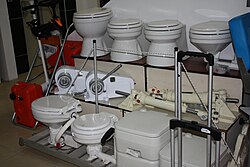Toilet that is easily moved around
 A portable urine-diverting dry toilet, marketed in Haiti by Sustainable Organic Integrated Livelihoods under the name "EkoLakay"
A portable urine-diverting dry toilet, marketed in Haiti by Sustainable Organic Integrated Livelihoods under the name "EkoLakay"
A portable or mobile toilet (colloquial terms: thunderbox, porta-john, porta-potty or porta-loo) is any type of toilet that can be moved around, some by one person, some by mechanical equipment such as a truck and crane. Most types do not require any pre-existing services or infrastructure, such as sewerage, and are completely self-contained. The portable toilet is used in a variety of situations, for example in urban slums of developing countries, at festivals, for camping, on boats, on construction sites, and at film locations and large outdoor gatherings where there are no other facilities. Most portable toilets are unisex single units with privacy ensured by a simple lock on the door. Some portable toilets are small molded plastic or fiberglass portable rooms with a lockable door and a receptacle to catch the human excreta in a container.
A portable toilet is not connected to a hole in the ground (like a pit latrine), nor to a septic tank, nor is it plumbed into a municipal system leading to a sewage treatment plant. The chemical toilet is probably the most well-known type of portable toilet, but other types also exist, such as urine-diversion dehydration toilets, composting toilets, container-based toilets, bucket toilets, freezing toilets and incineration toilets. A bucket toilet is a very simple type of portable toilet.
Types
[edit]
 A line of blue plastic portable chemical toilets
A line of blue plastic portable chemical toilets
Chemical toilets
[edit]
Main article: Chemical toilet
 Plastic-moulded outdoor cubicle, commonly used for chemical toilets at building sites and festivals
Plastic-moulded outdoor cubicle, commonly used for chemical toilets at building sites and festivals
A chemical toilet collects human waste in a holding tank and uses chemicals to minimize the odors. Most portable toilets use chemicals in this way and therefore are considered chemical toilets. The chemicals may either mask the odor or contain biocides that hinder odor-causing bacteria from multiplying, keeping the smell to a minimum.[1]
Enclosed portable toilets
[edit]
Enclosed portable chemical toilets are widely used for crowds at festivals, and for worksites without permanent toilets, such as early stages of construction and remote worksites.
On planes and trains, some toilets are chemical toilets, and others are vacuum toilets.
Portable camping toilets
[edit]
 Various boat toilets, including the most basic models on the bottom right
Various boat toilets, including the most basic models on the bottom right
A portable camping toilet has a seat and a small waste tank. Adding a packet of chemicals to the waste tank reduces odors and bacteria, until the waste can be dumped at an appropriate facility. They are used in camping, travel trailers, caravans, and camper vans. They may also be used on small boats which lack a built-in marine toilet.
WAG bags
[edit]